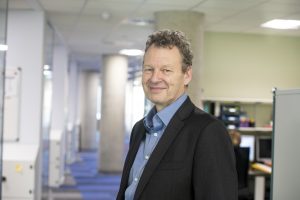In light of the COVID-19 outbreak, I want to send a message to all our supporters and let you know what actions we are taking at the Centre for Cancer Immunology to sustain our research, help with the efforts to mitigate the pandemic, and influence the national agenda.

These are challenging times for us all, but we have plans in place to keep our research support systems going as we transition to home working and/or full time clinical services. Essential services will be kept going by a dedicated technical team and a core group of scientist volunteers. We are prepared to lend our scientific equipment and donate basic supplies to our clinical colleagues as they prepare for a massive increase in the volume of tests for the COVID-19 virus over the next few weeks. Some of our scientists have volunteered to help process DNA samples for testing, supporting the local NHS England pathology team.
With the labs emptying out, I expect our research intensity to decrease over the next couple of months, but it is an excellent opportunity for researchers to process and analyse data they have been generating over the past weeks, and to write those papers, research proposals and to build new collaborations that you otherwise don’t have time for – Our new found skills in remote conferencing that we have had to develop in past couple of weeks will allow us to keep in touch with each other. We may even find that this new way of working will give rise to some creative and innovative thinking for future immunotherapy research.
Some funding agencies are showing the strain – while they still have the means to administer grants, it is more difficult to assemble the expert panels that are essential to guarantee funding is channelled to research of the very highest quality. For example, CRUK – a major funder of CCI- has cancelled the next round of expert review panels. Ian Foulkes, Executive Director, Research & Innovation at CRUK, said in a recent bulletin: “Our panels and committees involve people who work internationally and with vulnerable communities, and safeguarding their health is our priority”
This decision directly affects two of our research groups who currently have multi-million pound research proposals under consideration, and we are in negotiation with CRUK to arrange bridge-funding until the awards process resumes.
Our clinical staff are at the ready should they be called on to return to clinical duties. Both CRUK and Macmillan have recently issued very helpful statements for patients who may be worried about the impact of covid-19 on their treatment, including immunotherapy:
https://www.cancerresearchuk.org/about-cancer/cancer-in-general/coronavirus-and-cancer
https://www.macmillan.org.uk/cancer-information-and-support/get-help/physical-help/cancer-and-coronavirus
Many of us working in the CCI are immunologists, and have contributed advice to our professional body, the British Society for Immunology (BSI), who last Saturday sent an urgent open letter to the Chief Medical Officer, Chief Scientific Advisor and Secretary of State for Health & Social Care urging for more social distancing measures and more transparency on the models being used to predict the course of the outbreak. The immunological community is the most knowledgeable and credible on issues of herd immunity and this had a significant impact on shaping government policy over the following days.
Although this is a major stressor to our professional and personal lives, there will also be positives arising from the fresh perspectives that we may not otherwise reach. These will energise and enrich our research into new ways of deploying the incredible power of our immune system to fight cancer.
With very best wishes to you all.
Professor Tim Elliott